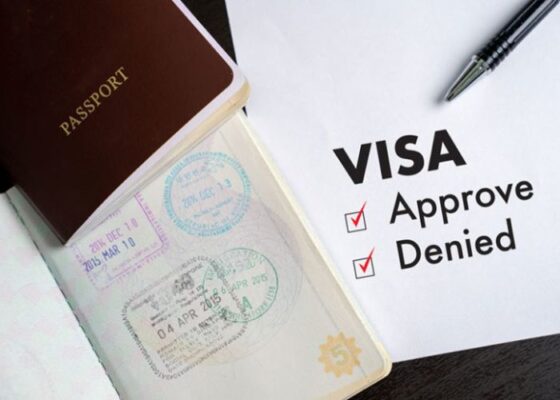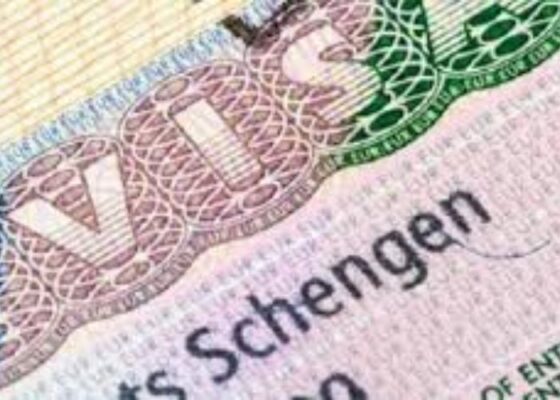
The Schengen visa, which allows tourists to enter 27 countries in Europe, serves as a gateway for a great number of customers from all over the world. The process of obtaining a Schengen visa, on the other hand, has become an increasingly difficult task for applicants hailing from African nations. Read below about “Why Schengen Visas Are Frequently Rejected for African Applicants”.
The rejection rates for African nations are among the highest in the world, according to the statistics, which frequently discourages candidates and raises worries. In 2022, Africa was the continent with the highest number of rejected applications, with thirty percent, or one in three, of all applications that were processed being rejected. This was despite the fact that Africa had the lowest number of visa applications per capita.
Why, then, do applicants from Africa have to contend with such high rates of rejection for Schengen visas? In this piece, we will investigate the factors that contribute to the high rejection rates, the effects that these rates have on African travelers, and the potential remedies that may be implemented to ameliorate the issue.
Table of Contents
The Schengen Visa: An Overview
With a Schengen visa, those who are not citizens of Europe are granted the ability to travel freely inside the Schengen Area, which is comprised of 27 European countries that have eliminated border controls at their share of borders. Due to the fact that it allows for admission into several countries with just a single permit, the visa is extremely popular among tourists, students, and business travelers.
Travelers from Africa frequently submit applications for Schengen visas for a variety of reasons, including tourism, business, education, and the reunification of family members. On the other hand, their own experience with the application process has been anything from smooth, with a significant number of applications being rejected.
Key Factors Behind High Rejection Rates
Incomplete or Incorrect Documentation: The failure to present documentation that is either complete or accurate is one of the most common causes for the denial of a Schengen visa application. Applications for Schengen visas require a variety of documents, including evidence of lodging, proof of travel insurance, a passport that is still valid, bank statements, and sometimes other documents. Due to a lack of access to particular financial or official data, a significant number of African candidates have difficulty satisfying these strict documentary criteria.
Perceived Risk of Overstay: European consulates are hesitant to provide visas to applicants whom they believe to be at risk of overstaying their visas because of the perceived risk of overstaying. As a result of the economic difficulties that beset many African nations, visa applicants from certain countries are subjected to a more stringent level of screening. Consulates frequently check for significant ties to the applicant’s home country, such as secure work, family duties, or property ownership, which would assure the applicant’s return to the country of origin during the application process.

Economic and Social Instability: Certain African countries are experiencing persistent political or economic instability, which has an effect on the percentage of visas that are approved. Countries that are currently suffering conflict or significant economic difficulties are frequently considered to be sources of migration that pose a higher danger. As a consequence of this, candidates from certain countries are subjected to a more stringent inspection, which results in a greater incidence of rejection.
Unreliable or limited financial resources: Providing evidence of one’s ability to meet financial obligations is a crucial prerequisite for getting a Schengen visa. The applicants are required to provide evidence that they are able to pay for their stay, which includes the costs of lodging, meals, transportation, and any other associated charges. As a result of low income levels, informal economies, or a lack of access to established banking systems, many African applicants find it difficult to provide evidence that they have sufficient funds.
Observations Made Regarding African Tourists
As a result of the high percentage of Schengen visa rejections, African visitors and the communities they come from are subject to a number of rippling consequences. Applicants frequently experience these rejections after they have put time, money, and emotional energy into preparing travels, just to be turned away from applying for the position. The rejection of an application can be financially burdensome for those who are refused because visa payments are typically non-refundable and applicants may be required to reapply many times. Hope you get Why Schengen Visas Are Frequently Rejected for African Applicants.
The broader impact is also felt in the travel industry, as African businesses, like as airlines and travel agents, are impacted by the decreased number of Schengen visa applicants who are successful in their applications. Rejection of visas can cause African students to experience delays or even a complete cessation of their academic pursuits, which is another barrier they confront when attempting to study in Europe.
Confronting the Issue: Strategies for Potential Solutions
In spite of the fact that African applicants encounter a variety of obstacles, there are a number of steps that might be taken to help minimize the percentage of applicants who are rejected:
Improvements in Access to Information and Resources: A significant number of visa rejections are the result of misunderstandings regarding the application procedure or the absence of sufficient documents. In order to assist applicants in gathering the necessary documentation and avoiding frequent mistakes, governments, non-governmental organizations (NGOs), and embassies could collaborate to publish more transparent instructions and resources.
Support for the Processing of Visas: Several African governments have taken action in order to negotiate more favorable visa procedures with European nations. Through the use of these agreements, red tape may be reduced, and the process as a whole can be improved.
In addition, increasing the number of visa facilitation facilities could make the application process more accessible to communities that are geographically isolated or underserved.
Strengthening Economic Ties: It is possible that the deepening of economic connections between African governments and European nations could lead to improved visa approval rates. African governments should strive toward strengthening their economic and diplomatic ties with European states. Improved ties could result in improved migration management agreements, which would be to the advantage of individuals who are applying for visas.
Solutions to Financial Problems: Increasing access to formal financial services in Africa, such as savings and loan products, could assist applicants in demonstrating stronger financial positions. In order to assist applicants in meeting visa criteria, governments and banks should work together to develop savings products that are particularly tailored to meet those requirements.
Conclusion
There are a number of factors that contribute to the high Schengen visa denial rates for African countries. These barriers include problems with documents, the perception of an increased danger of overstaying, and economic considerations. Despite the fact that obtaining a visa can be a challenging procedure, there are a number of initiatives and reforms that have the potential to make the process more favorable for African tourists.
There is a possibility that the visa application process might be simplified by addressing the underlying problems and promoting more international cooperation. This would ensure that a greater number of African candidates would be able to explore opportunities in Europe without being subjected to an excessive amount of rejection. I hope you like reading “Why Schengen Visas Are Frequently Rejected for African Applicants”.

Visa Expert, Arun Yadav is an accomplished immigration lawyer specializing in Spouse Visas, Visa consultant, Study Visas, and low-budget fund advising all across the world. With a Master’s degree in Immigration Law and 8+ years extensive experience in the field, Arun has cultivated a reputation for excellence and reliability by helping 3000+ clients for Visa consultation. He is dedicated to bridging education opportunities and securing visas for his clients. Explore expert advice and immigration tips on his Instagram profile: @visaexpertarunyadav. Follow his insightful content and benefit from his professional guidance in navigating the complexities of immigration law and visa acquisition.




